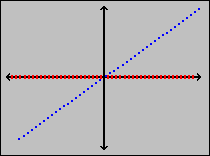6.2. Continuous Functions
Example 6.2.4(b):
If
f(x) = x if
x is rational and
f(x) = 0 if
x is
irrational, prove that
x is continuous at
0.

Back

If one looks at this poor representation of the function, we see that it does not at all
look continuous. But if
{xn} is any sequence of numbers (rational
or irrational) that converges to zero, then there exists an integer
N such
that
|xn| < 
for
n > N. But
f(xn) is either zero or
xn itself, and in any case we have
| f(xn) |  |
xn| <
|
xn| < 
That proves that the sequence of
{xn)} converges to
0 = f(0),
which proves that the function is continuous at zero.
As an exercise, prove that the function is not continuous for
any other x.

 for n > N. But f(xn) is either zero or
xn itself, and in any case we have
for n > N. But f(xn) is either zero or
xn itself, and in any case we have
| xn| <

 Interactive Real Analysis
Interactive Real Analysis